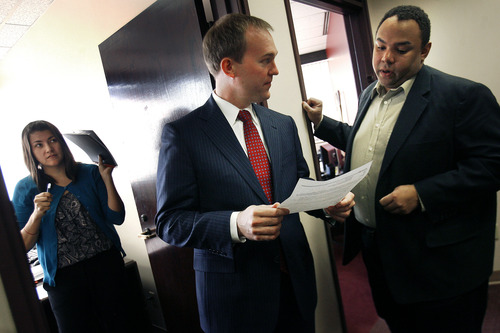This is an archived article that was published on sltrib.com in 2013, and information in the article may be outdated. It is provided only for personal research purposes and may not be reprinted.
When Salt Lake County's mayor holds a Cabinet meeting, should the mayor be required to post an agenda in advance, record proceedings and make minutes available?
A provision requiring that formal recordkeeping sparked considerable debate Tuesday when the County Council pondered several ordinance changes involving the structure of the executive branch.
Most of those proposed changes were not controversial, largely reflecting revisions made by Mayor Ben McAdams since he took office in January.
But the first-term mayor objected to council efforts to require him to treat Cabinet meetings the same as council meetings, which must comply with Utah's Public and Open Meetings law and the Government Records Access and Management Act (GRAMA).
"I favor openness and transparency," McAdams said. "My concern is the council telling the administration how to run its meetings."
It would be one thing, he said, if the council sought to establish a broad policy that applied equally to the mayor, council and the county's eight other elected officials. But the ordinance singles out the mayor's office, McAdams said.
"It's not within [the council's] powers to direct the executive branch on how they run their meetings," he said, offering instead to issue an executive order that would enact many but not all of the open-meeting requirements.
Cabinet meetings have been open to the public and the news media for several years. McAdams' proposed executive order encourages elected officials "to make their staff and other meetings open to members of the public and to the media to the extent practical," specifying that his Cabinet meetings will be held at 8 a.m. on the first Monday of every month.
But he would not require formal advance notice and agendas or detailed minutes.
Nor would Cabinet members be guilty of a misdemeanor if they missed a meeting, which would be the case under terms of the proposed ordinance. It said Cabinet members "shall" attend meetings, and Deputy District County Ralph Chamness noted that failure to comply with an ordinance is a misdemeanor.
To Councilman David Wilde, who pushed hard to make Cabinet meetings open, those objections can be resolved fairly easily with a few word changes. What's really important, he said, is to put checks on the executive branch pursuing its own agenda without council consultation.
Wilde said his experiences with former County Mayor Nancy Workman, who was embroiled in a 2004 scandal involving the alleged misuse of public funds, convinced him it's essential to require complete transparency.
"I've seen what happened under past mayors, and it could happen in the future. We should set up safeguards … to make sure it doesn't happen again," he said. "It caused huge trauma for this county."
Wilde didn't think an executive order governing Cabinet meetings was sufficient, noting that "what the mayor giveth, the mayor can taketh away." And he said it would be easy for the mayor to record Cabinet meetings.
He had the backing of Council Chairman Steve DeBry, who opined that "the vast majority of the county populace want the most transparency we can give them."
But there were philosophical reservations, even within the council's Republican majority, to a legislative body imposing its will on the executive branch.
"I struggle with the separation-of-powers argument," said Councilman Michael Jensen, a Republican. The mayor's role is different from the council's, he said, asking for another week to "sit down with you guys and get the bigger picture in my head. Should the same standards apply to both [branches of government]? I think no."
County District Attorney Sim Gill also expressed concerns about the council expanding the open-meeting requirement to all of the independently elected officials, as McAdams suggested.
He noted that his meetings with senior staff frequently involve discussions about civil and criminal cases, or sensitive subjects such as personnel decisions. "There are other ways to get at transparency," Gill contended.
Wilde countered that many of Gill's concerns are covered by existing open-meetings law and GRAMA.
The discussion will resume at Tuesday's council meeting.
Twitter: @sltribmikeg



